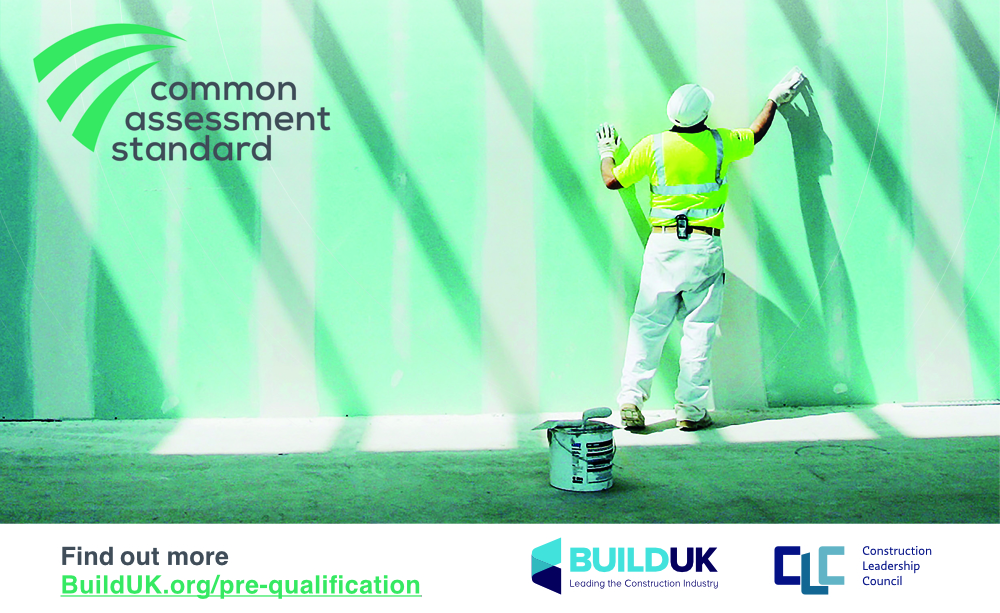Common Assessment Standard updated with mandatory building safety questions
Contents |
[edit] Update announcement
On 1 July 2025, Build UK published an updated version of the Common Assessment Standard (CAS). The Building Safety section must now be completed by all companies that carry out design or building work under the Building Safety Act. Completion of the Building Safety section was ‘advisory’ for the first 12 months after its introduction in July 2024 to allow the industry to get up to speed with the new requirements; it is now mandatory.
Jo Fautley, Build UK Deputy Chief Executive, said: “Anyone carrying out work under the Building Safety Act who wants to reduce the bureaucracy of pre-qualification should make sure they have the Common Assessment Standard, which is being used across the public and private sectors. If you hold multiple certifications, you should check to see if you have the Common Assessment Standard more than once and why that is.”
[edit] What is the Common Assessment Standard?
The Common Assessment Standard (CAS) is the industry-agreed standard for pre-qualification, a set of questions and corresponding assessment standards for the pre-qualification of suppliers. It improves quality standards and reduces duplication across construction.
There are two levels of certification: desktop and site-based, which build on the PAS 91 pre-qualification questionnaire, helping contractors achieve compliance and mitigate risks across essentially 13 key areas of risk management. Evidence of compliance in these areas is normally required once a year via an online portal. The Building Safety section was first introduced in 2024, and in the updated Version 5 published in July 2025, it is now mandatory.
The Common Assessment Standard was developed by Build UK, the Civil Engineering Contractors Association (CECA), and other accreditation bodies and industry experts. It was launched initially in 2019, at which time CHAS became the first assessment body to offer the scheme. In 2021 the introduction of a data-sharing agreement accelerated its adoption, meaning the details of those who pass the assessment can be accessed via any of the providers, regardless of which assessment body carries out the audit. The standard is regularly reviewed, and on 1 July, 2024, Version 4 of the Common Assessment Standard included the new Building Safety section, ensuring its use to demonstrate companies have the organisational capability to fulfil their roles under the Building Safety Act.
[edit] What are the new requirements?
Under the Building Safety Act, anyone appointing individuals or organisations to undertake work has a duty to ensure they are competent. Organisations must demonstrate ‘organisational capability'.
The Common Assessment Standard is being used by a growing list of clients, contractors, and suppliers to demonstrate compliance. As a result, a number of Build UK members will be specifying that members of their supply chains must have successfully completed the Building Safety section by 1 October 2025.
The Common Assessment Standard is regularly updated to meet industry needs and simplifies the pre-qualification system for businesses across the supply chain. Version 5 also includes updates to the Corporate and Professional Standing, Environmental, and Fairness, Inclusion & Respect (FIR) sections of the question set to reflect new legislation and guidance.
More than 21,000 suppliers have now been certified against the Common Assessment Standard by the seven Recognised Assessment Bodies, and a data-sharing agreement means that companies need to obtain certification only once from any of the Recognised Assessment Bodies.
[edit] Where can a company get certified?
There are seven Recognised Assessment Bodies which can certify companies to the Common Assessment Standard:
- Achilles supports organisations that require robust environmental, social and governance reporting to fully comply with ESG regulation, meet investor requirements, and achieve their own ambitious sustainability goals. Originally created to help Norway’s offshore oil and gas industry meet health and safety standards more efficiently, it introduced the “network effect” to enable buyers and suppliers to work together through a single platform to reduce duplication, improve compliance, and drive mutual value, with 22 locations worldwide.
- Compliance Chain was originally as a tool for supply chain compliance, specifically for Procure Partnerships Frameworks and supply chain monitoring, it expanded to help manage other compliances. Supporting clients, principal contractors and suppliers with visibility and control over their supply chain, project management and social value management, helping access new business opportunities by demonstrating compliance.
- Constructionline was originally created as a Government department, and for over 20 years has been supporting thousands of businesses across the public and private sectors. It is part of the Once For All Group; leaders in risk management, compliance, supply chain management & sourcing for the construction and FM industries.
- CQMS previously Crown Quality Management Services) is a health and safety consultancy established in 1994 and based in Grantham, Lincolnshire covering the whole of the UK. They aim to bring all health and safety needs together ensuring proactive management of health and safety obligations.
- The Steel Construction Certification Scheme (SCCS) is the UKAS Accredited Certification Body (No. 0021) specifically for companies engaged in the design, fabrication and erection of constructional steelwork for all forms of industrial, commercial and administrative. This extends through the supply chain, from companies manufacturing and processing structural steel, to companies providing components for fabrication and erection.
- Smas Worksafe was established since 2006, experts in helping businesses manage health and safety obligations. Providers of health and safety assessments and full form SSIP (Safety Schemes in Procurement) with every assessor SSIP Assessor Trained and audited by an independently appointed SSIP Auditor.
- Veriforce CHAS is a provider of compliance and risk management solutions, to help contractors (suppliers) and clients (buyers) ensure supply chain compliance, mitigate risks and support efficient supply chain management. Co-founder of Safety Schemes in Procurement (SSIP) and the Common Assessment Standard, it works on compliance issues with construction, education, facilities management, and housing and development.
[edit] Industry reactions
The Electrical Contractors’ Association (ECA) said "it is currently reviewing the new questions and will issue a revised version of the ECA CAS Manual in the near future. The CAS, produced by Build UK, now includes a Building Safety section that is mandatory for completion by all companies that carry out work under the Building Safety Act. A number of Build UK members will be specifying that members of their supply chains must have successfully completed the Building Safety section by 1 October 2025. Version 5 also contains updates to the Corporate & Professional Standing; Environmental; and Fairness, Inclusion & Respect sections. "
[edit] Related articles on Designing Buildings
- Common Assessment Standard uptake grows.
- Common Assessment Standard.
- Common assessment standard CAS.
- Public sector PQQs look to the Common Assessment Standard.
- The common assessment standard.
- The 2024 update of the Common Assessment Standard to demonstrate organisational capability.
- The latest Common Assessment Standard version to demonstrate organisational capability.
Featured articles and news
Government consultations for the summer of 2025
A year of Labour, past and present consultations on the environment, the built environment, training and tax.
CMA competitiveness probe of major housing developers
100 million affordable housing contributions committed with further consultation published.
Homes England supports Greencore Homes
42 new build affordable sustainable homes in Oxfordshire.
Zero carbon social housing: unlocking brownfield potential
Seven ZEDpod strategies for brownfield housing success.
CIOB report; a blueprint for SDGs and the built environment
Pairing the Sustainable Development Goals with projects.
Types, tests, standards and fires relating to external cladding
Brief descriptions with an extensive list of fires for review.
Latest Build UK Building Safety Regime explainer published
Key elements in one short, now updated document.
UKGBC launch the UK Climate Resilience Roadmap
First guidance of its kind on direct climate impacts for the built environment and how it can adapt.
CLC Health, Safety and Wellbeing Strategy 2025
Launched by the Minister for Industry to look at fatalities on site, improving mental health and other issues.
One of the most impressive Victorian architects. Book review.
Common Assessment Standard now with building safety
New CAS update now includes mandatory building safety questions.
RTPI leader to become new CIOB Chief Executive Officer
Dr Victoria Hills MRTPI, FICE to take over after Caroline Gumble’s departure.
Social and affordable housing, a long term plan for delivery
The “Delivering a Decade of Renewal for Social and Affordable Housing” strategy sets out future path.
A change to adoptive architecture
Effects of global weather warming on architectural detailing, material choice and human interaction.
The proposed publicly owned and backed subsidiary of Homes England, to facilitate new homes.
How big is the problem and what can we do to mitigate the effects?
Overheating guidance and tools for building designers
A number of cool guides to help with the heat.
The UK's Modern Industrial Strategy: A 10 year plan
Previous consultation criticism, current key elements and general support with some persisting reservations.
Building Safety Regulator reforms
New roles, new staff and a new fast track service pave the way for a single construction regulator.

























